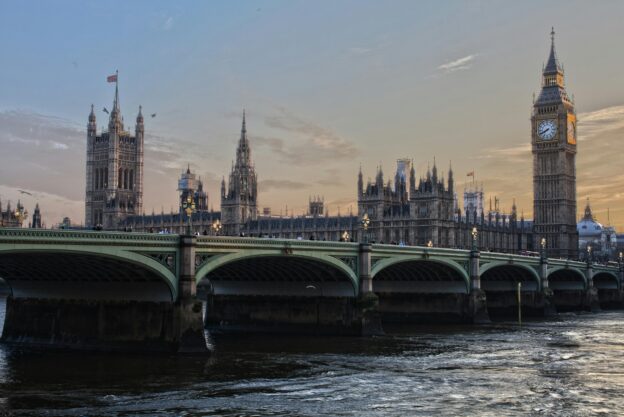General Election Update
5th July 2024
Election Result
As widely anticipated by all major polling conducted during the election campaign, the Labour Party secured its second-best electoral performance after Tony Blair in 1997 with a projected majority of 170 seats. The Labour Party leader, Sir Keir Starmer, will be appointed as Prime Minister in an audience with the King this afternoon. Achieved on a share of almost 35% of the vote – a tally lower than that achieved by Jeremy Corbyn in 2017 – Labour has benefitted significantly from the increase in the Reform UK vote, which has had the effect of splitting the right-wing vote in many key constituencies.
The Conservative Party has seen its support collapse across many parts of the country. Its projected final tally of approximately 120 MPs is worse than when it previously lost office in 1997 – with over 200 Conservative MPs losing their seats, including many prominent Cabinet ministers, including Penny Mordaunt, Grant Shapps, Alex Chalk and Gillian Keegan. The party vote share also provides grim reading having gone from 43% of the vote share in 2019 to 23%
Reform UK has outperformed initial expectations, polling 14% nationally, with its leader and chairman, Nigel Farage and Richard Tice, both being elected to Parliament for the first time. The Liberal Democrats have significantly improved on their previous performance; returning over 70 MPs to the new House of Commons, having picked up a large number of seats off the Conservative across the south of England. Meanwhile, the Scottish National Party has collapsed across Scotland, losing its status as the third largest party in Parliament to the Liberal Democrats with a mere 9 seats.
Next Steps
It is expected that the new Prime Minister will appoint his cabinet later this afternoon, which will then meet for the first time tomorrow morning. Whilst most cabinet ministers are likely to take on the portfolios they shadowed in opposition, some changes will be necessary in order to fill gaps left by the two shadow ministers who lost their own seats – Jonathan Ashworth and Thangam Debbonaire. Junior ministerial appointments are expected to follow over the course of the weekend.
The new House of Commons will meet for the first time on Tuesday 9th July, where MPs will be sworn in and elect a Speaker. The State Opening of Parliament and King’s Speech are due to take place on 17th July, where the new Government’s legislative priorities for the coming year will be set out. The Labour Government’s first budget is not expected until at least September, with incoming Chancellor Rachel Reeves having previously stated that she would give the Office for Budget Responsibility the ten-weeks required it requires to conduct a forecast before delivering any fiscal event.
Analysis from GK Senior Advisers
David Laws, former coalition government minister
“It was expected to be brutal, and it was. On 4th July, the UK electorate handed to the Conservative Party a redundancy notice, delivering it its worst ever electoral defeat in its 200 year history. Amongst the final results to be announced was that of ex PM Liz Truss, who has been thrown out of Parliament. The constituencies of Boris Johnson, Theresa May and David Cameron are now all in Labour or Lib Dem hands”.
“Political parties that have been in power for long periods are always at risk of landslides, but this was more than a landslide – it was a political earthquake, sweeping away numerous ministers and around two thirds of Conservative MPs. The public wanted revenge for the low personal standards of Boris Johnson, the economic chaos unleashed by Truss, and a Parliament of declining living standards”.
“With a few seats left to declare, Labour looks set to end with over 400 seats, perhaps just short of Blair’s 1997 haul of 418. The Lib Dems are now expecting a massive boost to their numbers – with over 70 MPs, three times their expectation of a year ago. The Conservatives have dropped well below their previous 1906 low of 156 seats, and the SNP will lose around 80% of their seats. Reform UK currently have 4 seats – crucially including Nigel Farage”.
“Labour now has a huge majority and can get on with delivering its programme for government. The results are broadly as expected by the polls, but with a couple of important caveats. Many pollsters thought the Conservatives might do even worse – finishing with well below 100 seats. The Tories are still though (just about) in business, with over 120 seats . The Lib Dems have exceeded even their own very highest private expectations, while the SNP have suffered a much bigger blow than expected – on the scale of the Lib Dem 2015 wipeout. And while Labour will be over-joyed to be in government with a solid majority, their seat total was well below the 450-480 level that many pollsters forecast, while their vote share (around 35%) is mediocre at best given the Conservative meltdown, and well below their recent ratings of 42/43%”.
“What are the implications? Let’s start with the easy ones. The Lib Dems are back in business. The SNP is in a deep hole and an independent Scotland is a very distant prospect. Reform UK are going to remain a real influence, with Farage in Parliament. Labour interest in voting reform may wane given their predicament and that PR would largely benefit Reform UK at present”.
“The big implications? The Conservative Party is in a deep hole. In 1906, its 156 seats still resulted from a healthy 43% vote share. This time the Tories polled a miserable total of around 24%. They are now likely to split between those wanting to move back to the centre ground and others looking for a partnership with Farage to reunite the right-wing vote. There are nasty choices to be made which all have major risks”.
“Meanwhile Labour looks in a superficially very strong position, but sensible Labour MPs will realise that the party’s resilience beyond the next election is far from guaranteed. Their victory owes almost everything to Tory weakness and the impact of Reform rather than enthusiasm for Labour. Seats that come easily can go easily. Farage has already put Labour on notice that it is now aiming to suck away predominantly Labour voters and win seats in areas where Reform’s strong vote gives them a good future chance. Farage will now target Labour on issues such as immigration, net zero costs, the state of the NHS, higher living standards, and relations with the EU. If Labour doesn’t deliver rapidly in office, it could face a pincer movement in future elections from Reform to its right and Lib Dems/Greens/Nationalists to the left”.
“Starmer is right that he changed his party and helped them exploit the Conservative weakness. But the failure of most disillusioned Tories to switch to Labour, and their inclination to go instead to Reform or stay at home should worry Starmer greatly. He has done the easy bit. Governing well will be harder. The electorate has decided clearly that it wants the Conservatives gone. Whether it wants a Labour government for long is still an open question”.
—
Phil Hope, former Labour government minister
“Labour’s landslide victory carries profound political, social, and economic significance, marking a seismic shift from recent Tory dominance and a realignment of voter priorities. The nation has given Labour a mandate for progressive policies to address inequality, climate change, and improve public services. This victory symbolizes a cultural shift that rejects austerity, turmoil, and inward-looking attitudes; and endorses economic competence and stability, trust and good governance, humanity and social justice, decent public services, fairness at work and strong international relationships”.
“But the practical reality is very tough. In inheriting a grim economic situation and broken public services, Labour’s long-term mission will be to rebuild trust and prosperity over time. The focus will be on sustainable economic growth through attracting private investment, supporting public infrastructure, and more effective regulation of critical utilities and services. New approaches to green energy, technology and AI, rapid house building, economic devolution, and workforce skill upgrades will drive sustainable growth. Internationally, Labour will pursue closer economic ties with the European Union and adopt a multilateral approach to global challenges and conflicts”.
“Limited and targeted tax reforms on wealth will secure greater contributions from the affluent to address immediate challenges in public services such as the NHS, social care, and education, alongside better support for families on low-incomes. But substantial investment in public services and significant support for those in most need will only come from future economic growth”.
“The election will spark intense internal debate within the Conservative party regarding its direction, policies, and identity. The influence of Reform and its xenophobic populism will exacerbate internal divisions and trigger a bitter leadership struggle to redefine the party’s vision. The outcome could see a centrist shift to regain moderate voters or, more worryingly, a pronounced rightward shift to consolidate the base”.
“The 2024 election marks a pivotal moment for the nation and a turning of the page on the past. It will be very challenging with high expectations of change. But Labour’s huge majority enables them to confidently plan a phased decade of renewal, and to build the restoration of trust in our national and democratic institutions. It allows Labour, over time, to reshape the UK’s domestic landscape, and regain Britain’s position as a reliable partner in the global framework for sustainable growth, peace and security”.






